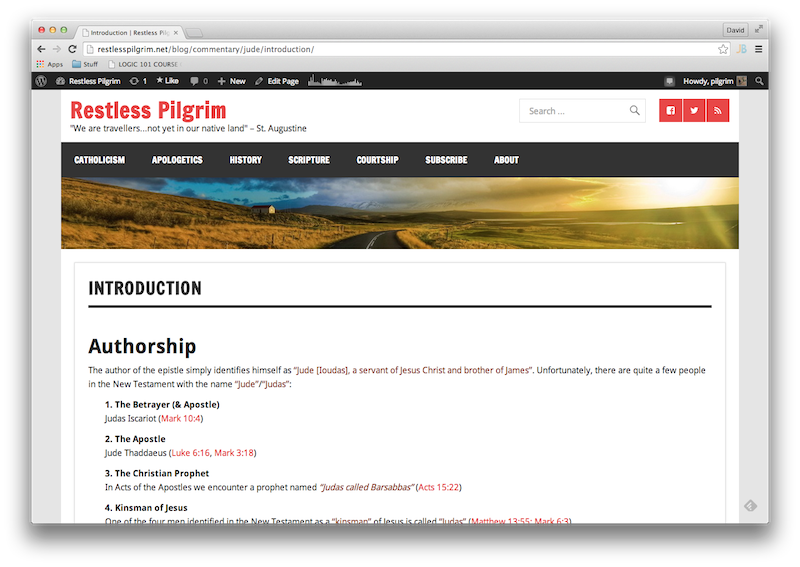Ephesians Commentary
At the moment in Bible Study we’re going through Paul’s epistle to the Ephesians. I’m therefore in the process of adding content to the Commentary section of this website:
"We are travellers…not yet in our native land" – St. Augustine
At the moment in Bible Study we’re going through Paul’s epistle to the Ephesians. I’m therefore in the process of adding content to the Commentary section of this website:
 This…is…adorable!
This…is…adorable!
Today in Bible study we’re going to be looking at the Epistle of Jude. Although they’re fairly preliminary, my notes are now available in the Commentary section of this website:
 I’m trying to pull together all my various notes about the different books that we’ve studied. I’ll be chipping away at that over the next few months.
I’m trying to pull together all my various notes about the different books that we’ve studied. I’ll be chipping away at that over the next few months.

I’ve recently started studying the first five books of the Bible in more depth. Almost as soon as I started, I had an “Oh, I never knew that!” moment which is the subject of today’s post.
The opening books of the Bible are known by the Greek word “Pentateuch”, which literally means “five volumes”. Unsurprisingly, there are five books which make up the Pentateuch:
1. Genesis
In Greek, “Genesis” means “Beginning”, which is an appropriate title for this book since it describes the Creation of all things. It also covers the lives of the early Patriarchs, up until the time of Jacob and the Twelve Tribes.
2. Exodus
The second book of the Bible describes the escape of the Children of Israel from Egypt and the giving of the Ten Commandments on Sinai. This is reflected in the book’s title, which literally means “Departure”.
3. Leviticus
If you’ve ever tried to read Leviticus, you’ll know that it goes into great detail concerning all the different sacrifices in the cultic worship of Israel. This worship was performed in the Temple by the priestly tribe of the Levites, which gave rise to the this volume’s title, “Book of the Levites”.
4. Numbers
This book recounts the events of Israel’s sojourn in the desert. Unlike the other volumes in the Pentateuch, its title is not very descriptive, being so named because the opening pages of the book concern a census that was taken among the people.
5. Deuteronomy
The final volume in the Pentateuch contains the Law given by Moses on the plains of Moab prior to his death and before the entry into the Promised Land.
My first “Oh, I didn’t know that!” moment was when I found out the meaning of this book’s title. The Greek word for “Law” is “nomos” and it’s the word used throughout the New Testament to refer to the Law of Moses. You can see this Greek word hidden away in the name of the book: “Deuteronomy“. The prefix, “deutero” means “second” (e.g. “deuterocanon” means “second canon”). Therefore, “Deuteronomy” means “Second Law”. It is so called because it’s the second major piece of legislative material in the Books of Moses.
I previously knew that the Jewish people often refer to the Pentateuch as “The Torah”, the Hebrew word for “Instruction”, “Teaching”, or “Law”. However, what I didn’t know was that the they have different names for each of these books. The names which I listed above (Genesis, Exodus, …) come from the Septuagint (LXX), the Greek translation of the Pentateuch sometime around 250 BC. Within Judaism, however, the following Hebrew names are used:
1. Bereshith (“In the Beginning”)
2. Shemuoth (“Names”)
3. Wayiqra (“And he said”)
4. Bamidbar (“In the desert”)
5. Debarim (“Words”)
As you might be able to guess from the translations in parentheses, the Jews follow the same naming convention used in Catholic Papal Encyclicals, naming the book after the opening words of the document.
Well, that’s enough nerding out for one day… 🙂
 Doug Beaumont from Soul Device giving a presentation on the canon of Scripture:
Doug Beaumont from Soul Device giving a presentation on the canon of Scripture:
(Thanks to Procreo for this video)
If you live around Escondido, you might like to know that John Paul The Great Catholic University is having a free lecture series on the Early Church Fathers and Sacred Scripture, every Thursday for the next six weeks:
I have two Jehovah Witnesses (JW) coming to see me this weekend…

You see, two JWs turned up at my door about a month ago. They asked about religion so I told them a little bit about my faith journey. I explained how the issue of the canon (the Bible’s table of contents) was one of the decisive topics which brought about my return to Catholicism.
How did they know that the table of contents was correct, I asked. I knew the various standard Protestant answers to this question and found them all unconvincing, but I wondered how a JW would answer it. The two missionaries at my door said they couldn’t answer that question, but they’d go find out and get back to me.
(This was, by the way, an excellent answer. When someone asks you a question and you don’t know the answer, it’s far better to say you don’t know, rather than trying to make something up on the spot. Just make sure that you do actually find out the answer and come back)
Well, this last Saturday I had two older chaps turn up at my door. I invited them in but they didn’t want to and instead booked an appointment with me for this weekend. I’m currently looking to find an icon of St. Nicholas to put up in time for their visit 😉
(There was a legend that St. Nicholas punched Arias in the face at the Council of Nicaea for denying the full deity of Christ, a doctrine also affirmed by JWs)
I didn’t want to end this post without briefly mentioning something else on the subject of JWs. Not all Catholics will feel comfortable meeting with JWs and discussing theology, and others might just simply don’t have the time. However, I would like to share something that a friend of mine does when JWs call. She simply says the following:
 “It’s really great that you care so much about your faith that you’re willing to give up your Saturday mornings to do this, but I should probably tell you I’m Catholic. In fact, I’m reeeeally Catholic, so I think I’d probably just be a waste of your time.
“It’s really great that you care so much about your faith that you’re willing to give up your Saturday mornings to do this, but I should probably tell you I’m Catholic. In fact, I’m reeeeally Catholic, so I think I’d probably just be a waste of your time.
It’s pretty hot outside today though, so would you like to take a chilled bottle of water to take with you?”
So, if you have to go pick up the kids for soccer practice or you’re busy getting brunch together and don’t have the time, I think this is a great response to give. It’s simple, it takes a grand total of thirty seconds to say and demonstrates concretely the love of Christ to those who love God enough to face rejection and abuse from strangers every week.
For truly, I say to you, whoever gives you a cup of water to drink because you bear the name of Christ, will by no means lose his reward. – Mark 9:41